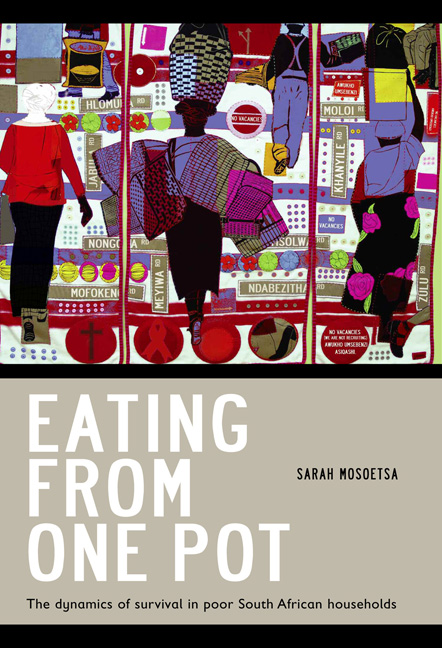Book contents
- Frontmatter
- Contents
- Foreword
- Acknowledgements
- Introduction
- Chapter 1 ‘Sharing the little I have with my family’: the allocative rules of household resources and income
- Chapter 2 ‘My wife does not respect me anymore’: unequal power dynamics in households
- Chapter 3 ‘I remain an ANC member, but …’: civil society in Mpumalanga and Enhlalakahle
- Chapter 4 Theoretical and Policy Implications
- Conclusion: Poor households are fragile sites of stability
- Selected Bibliography
- Index
Chapter 3 - ‘I remain an ANC member, but …’: civil society in Mpumalanga and Enhlalakahle
Published online by Cambridge University Press: 20 April 2018
- Frontmatter
- Contents
- Foreword
- Acknowledgements
- Introduction
- Chapter 1 ‘Sharing the little I have with my family’: the allocative rules of household resources and income
- Chapter 2 ‘My wife does not respect me anymore’: unequal power dynamics in households
- Chapter 3 ‘I remain an ANC member, but …’: civil society in Mpumalanga and Enhlalakahle
- Chapter 4 Theoretical and Policy Implications
- Conclusion: Poor households are fragile sites of stability
- Selected Bibliography
- Index
Summary
Civil society has experienced something of an identity crisis in postapartheid South Africa.1 It is not always clear about what its role should be. Civil society faced a very different kind of challenge during the apartheid era when it had to find ways of counteracting the destruction of an enabling political and social environment by the state. Freedom of association was thwarted by the banning of organisations such as the African National Congress (ANC). New organisations had to be created in order to fill the vacuum left by the banning of the older organisations (Baskin, 1991; Seekings, 2000). These included the United Demo - cratic Front (UDF) and the Federation of South African Trade Unions (Fosatu), which later became the Congress of South African Trade Unions (Cosatu). The pass laws, the creation of homelands and the declaration of a state of emergency in the country hampered freedom of movement. There was also censorship of the public media and very little access to state information. Meaningful political participation in the country was reserved for whites. Indian and coloured people were allowed to participate in the tooth less tri-cameral parliament in terms of the 1983 Constitution while Africans were supposed to exercise their political rights in the homelands. Not surprisingly, the efforts of civil society organisations were focussed on achieving political emancipation. The relationship between the state and civil society was adversarial, characterised by conflict and violence. Civil society played a leading role in obtaining the end of apartheid and realising democracy in the country.
The democratically elected government has introduced progressive laws that give civil society an important role in the consolidation of democracy in South Africa. The National Economic Development and Labour Council (Nedlac), for example, brings government, organised business, organised labour and organised community groupings together on a national level to try to reach consensus about social and economic policy. The adoption of South Africa's new constitution in 1996 was a particularly significant development for civil society. The constitution defines all citizens, regardless of race, gender, age, political affiliation and religion, as equally entitled to the rights, privileges and benefits of the country; including the right to basic health care, sufficient food and water, social security and the right to freely associate and to join and take part in the activities of different organisations.
- Type
- Chapter
- Information
- Eating from One PotThe dynamics of survival in poor South African households, pp. 81 - 113Publisher: Wits University PressPrint publication year: 2011



